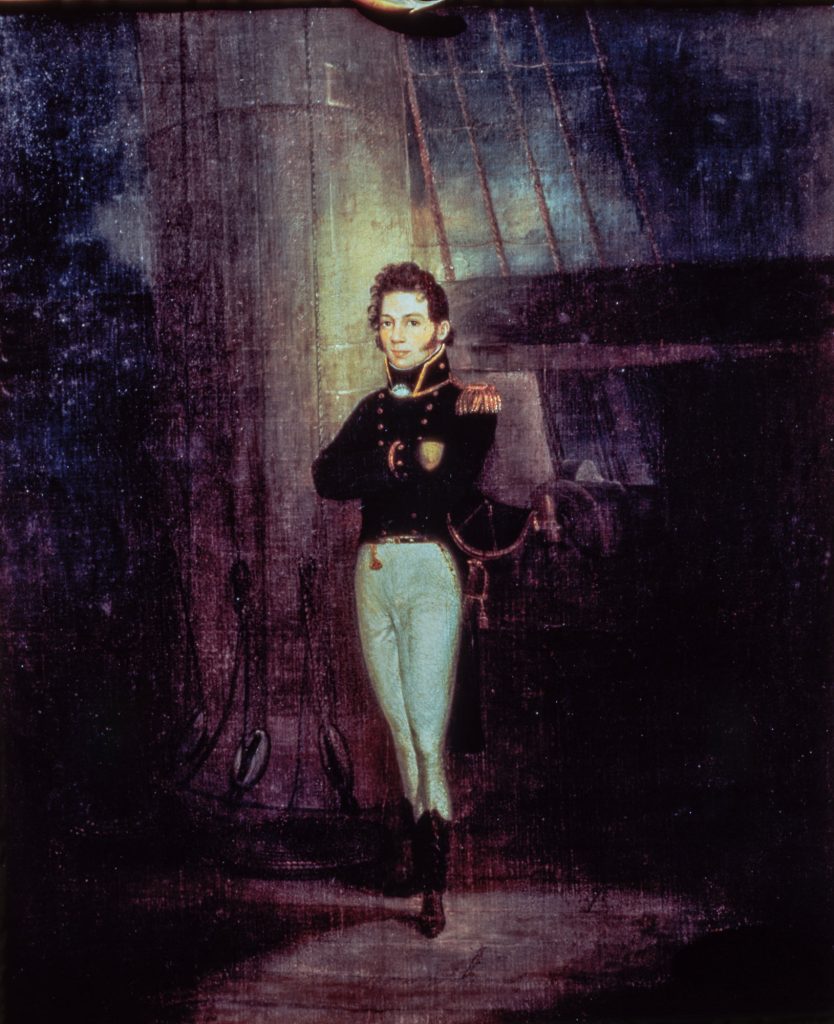Uriah P. Levy’s life was marked by obstinacy, a quick temper, and fierce individualism—not necessarily qualities that one associates with military service. And yet, he became the first Jew to achieve the rank of commodore—then the highest in the U.S. Navy.
Born and raised in Philadelphia, Uriah was born to Michael Levy and Rachel Phillips Levy whose other sons included Benjamin and Jonas Phillips Levy, both to become ship captains. Rachel’s father, Jonas Phillips, was said to have had a particular fondness for Uriah, and likewise, the grandson was inspired from a young age by tales of his grandfather—shipping tycoon and Revolutionary War hero. Perhaps with these things in mind, and certainly with a sense of adventure, Levy left home at ten and found work as a cabin boy on a merchant ship.
He returned to Philadelphia to celebrate his bar mitzvah and spent the next few years apprenticing with a family friend and ship owner, sailing first as a seaman, then a second mate. At the end of his apprenticeship, in 1811, he became part proprietor and captain of a schooner, the George Washington.
With the outbreak of war the following year, Levy volunteered with a Naval ship named the Argus, where he was quickly promoted to acting lieutenant. The ship was captured, and Levy and the rest of the crew spent the war in Dartmoor Prison.
After his release and return to America, Levy served aboard the Franklin as sailing master. It was there that he had his first run-in with anti-Semitism. Levy had attacked an officer who had drunkenly hurled an epithet at him. Challenged to a duel, Levy accepted and killed the man. He was arrested and eventually acquitted. This was the first of numerous fights and trials that would mark Levy’s Naval career, including one court martial that would have to be overturned by President Monroe.
He next served as second lieutenant on the Cyane. While the ship was docked in Brazil, Levy famously freed an American soldier impressed into the Brazilian Navy. Not only did the incident win him the admiration of his crew, but so impressed was Emperor Dom Pedro by Levy’s courage that he declared no American should ever again be forced to serve in the military in Brazil. He also offered Levy a post as captain in the Imperial Brazilian Navy; an offer which Levy legendarily rejected by saying, “I would rather serve as a cabin boy in the United States Navy than hold the rank of Admiral in any other service in the world.”
Levy later took a leave of absence and during this period made a fortune in New York real estate. He spent two years living in Paris during which time he commissioned a statue of his hero, Thomas Jefferson. It was also during this break from naval service that Levy first visited Monticello, Thomas Jefferson’s estate, and found it in terrible disrepair. He soon purchased the property and invested in its restoration.
In 1838 he was given command of the Vandalia, and here he instituted a series of innovations governing conduct and discipline, the start of a naval reform campaign for which he would be best remembered. At the heart of the reforms Levy instituted aboard the Vandalia was his ban on flogging. These ideas proved heatedly controversial, and soon enough Levy found himself once more before a court martial. This time he was dismissed from the Navy. And then, for the second time in his controversial career, a ruling against him was overturned by a United States president. Tyler not only reinstated Levy but promoted him to captain.
As Levy continued to petition the Navy for active assignment, he busily published articles and pamphlets condemning the practice of flogging. He was able to attract enough attention to the issue that a limitation on flogging was tacked on to the 1850 Naval Appropriations Bill; a complete ban would have to wait until 1862.
In 1853 he married his niece Virginia Lopez. The couple would not have any children. Two years following the marriage, Levy received a letter informing him that he had been removed from the Navy by the Naval Board of Officers. Levy petitioned Congress, and after convening a court of inquiry, they restored him, once more, to active duty. A few months later he received his orders—Levy was to take command of the Macedonian, and sail for the Mediterranean. In 1860 Levy was promoted to the rank of commodore and became flag officer of the Mediterranean squadron.
He returned to America after the outbreak of the Civil War and offered his services to the Union. Instead, Lincoln appointed him to the Court-Martial Board in Washington—this for a man who had himself been court-martialed six times.
Levy is remembered for his pioneering reforms and for saving and preserving Monticello, a project that may well constitute the first act of historical preservation in the United States and stewardship that would be continued by his nephew Congressman Jefferson Monroe Levy. His name has been honored adorning the Jewish chapel at the naval base in Norfolk, Virginia, the Jewish chapel and learning center at the Naval Academy in Annapolis, and on the USS Levy, which hosted the Japanese surrender ceremony during the Second World War.
